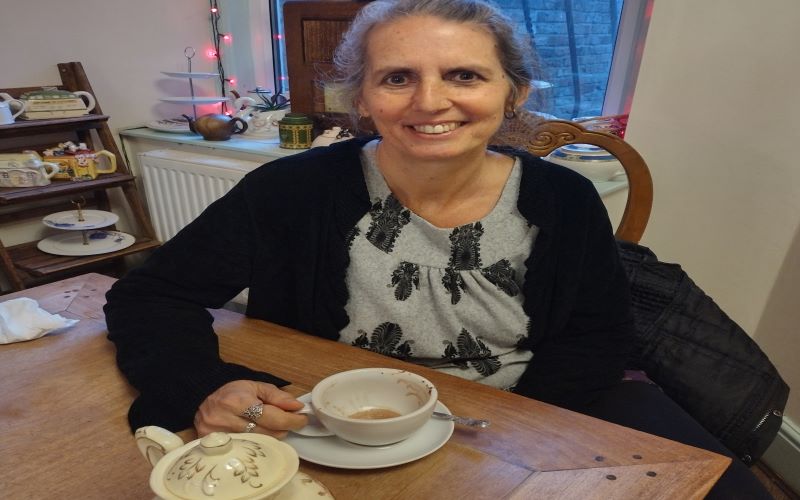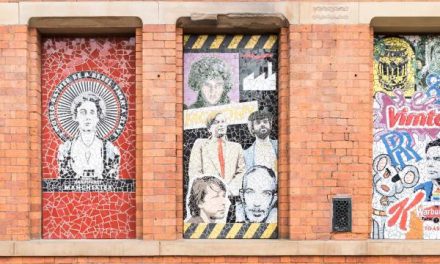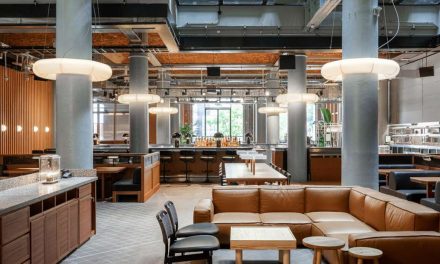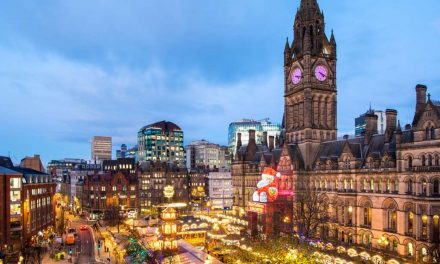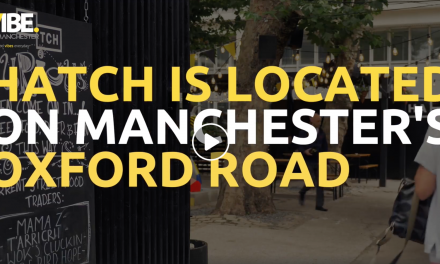“I lost my husband – no, I didn’t mislay him, he died five years ago!”
Despite the heavy subject matter, Iris Keating from Frodsham, is positively jubilant as she laughs at her own joke. She is bursting with life in a way that all of us should aspire to be at 69.
“Coming here, I get a great deal of- not confidence- I’m not lacking in confidence!” she cackles, “but a feeling of ‘you’re not on your own kid.”
This sense of validation, is what brings Iris all the way from ‘little leafy laned Frodsham’ in Cheshire to the Tea Hive café in Chorlton at 7pm on a Wednesday, a space ‘where you can just talk about it’.
‘It’- is a topic which seems rather out of place amongst the twinkling fairy lights and antique looking tea sets of the cosy suburban haunt.
“I said, ‘I’m going to a death café’,” Iris giggles, “my friend said, ‘oh I’ve been to one of those, great for the hard of hearing.’ I said, ‘not deaf, death!’”
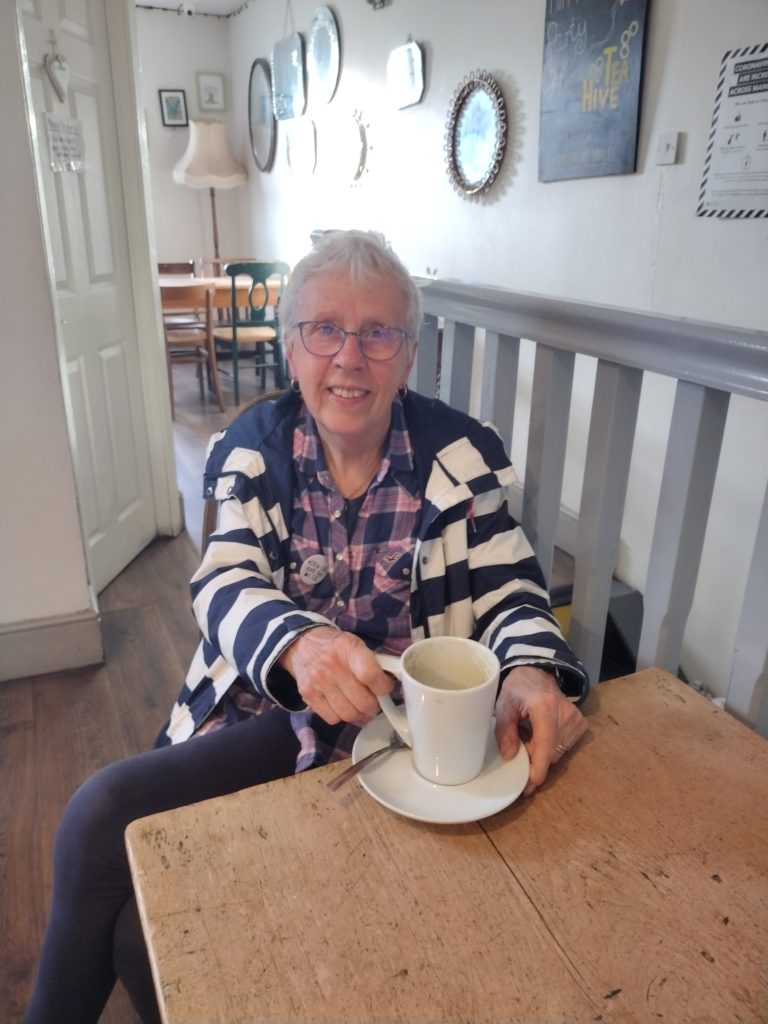
I’ll admit, the term Death Cafe at first conjured visions of seances and Ouija boards.
Despite research to the contrary, upon signing up, I was still entirely uncertain what to expect.
This, Iris assures me, is completely normal.
“A lot of people think, isn’t that really morose? Just the opposite, it can actually be celebratory.”
The Death Café idea first originated with Swiss anthropologist and sociologist Dr. Bernard Crettaz who organised the first Café Mortel in 2004.
Inspired by Crettaz’s work, the death café model and subsequent movement was founded in 2011 in East London by Jon Underwood and Sue Barsky Reid and has since spread worldwide with around 13,788 death cafés across 81 countries, and 2,743 in the UK alone.
People meet for frank discussions of their fears, thoughts and experiences surrounding death, to increase awareness of the issues it raises and with a view to overcoming apprehensions surrounding it and helping people live happy lives.
Debbie Jones, from Whalley Range, runs Chorlton’s Death Café on a voluntary basis.
“I love talking to people when the facades are down and they’re truthful with their emotions, it’s a great opportunity to learn about people.”
After sitting down with tea and cakes- the very antithesis of morose, the evening begins with a brief introduction during which Debbie sets the mood for the evening and provides much needed reassurance.
“Often people are nervous the first time, but by the end everyone leaves feeling a sense of community, hopefully they’ll have had a really good time!”
Formerly a primary school teacher, Debbie has been leading the sessions every other month since 2016.
“My role is to listen for anyone in distress and follow up, ask if they’d like some helpful resources. I also try and ensure everyone has chance to speak, and to bring in quieter people if they’d like to contribute.”
Alongside her job as a Celebrant leading humanist (non-religious) funeral services, Debbie, a committed Buddhist, credits running the Death Café with helping overcome her own fears around death.
“One Buddhist principle is awareness of impermanence, so I felt I was teetering on the edge of a precipice- at some point my loved ones were going to die, I had a lot of fear. You can push it away, decide never to think about death but I wanted to walk closer, I thought if I immersed myself, I could become more accepting. It’s a huge part of life, it seemed foolhardy not to talk about it.”
With 115 people on the mailing list for the café, she’s clearly not alone.
Though Covid has dented numbers somewhat, Debbie tells me how previous sessions have attracted up to 45 people, packing out the entire Tea Hive.
Of the regular attendees, almost all felt it had reduced their fear of talking about death.
“Meeting people who are bereaved, seeing them carry on, tell stories and laugh, it’s reassuring.” Debbie continues, “We can manage our emotions when told the truth, it builds trust. We shouldn’t try to ‘protect’ people by withholding the truth, it’s done with good intentions but ultimately doesn’t serve anybody.”
The mum of two explained she comes from a ‘family of helpers’, and a major motivation in hosting the sessions was wanting to be of service.
“With bereavement there isn’t a ‘fix’- but nobody needs you to, all they need is someone to listen because lots of people won’t, they’re scared they’ll say the wrong thing. People love to talk about those they’ve lost, our lived experience of them is still vivid.”
It quickly becomes apparent there’s no agenda- no structure, objectives, or set questions- stick to the theme of death and dying and anything goes!
Debbie explained, “We know people there want to talk about death, we don’t hold back like we might with family. Being in that space with others who want to listen- the benefits are enormous. It can feel wrong to mention death but when we talk openly, we feel less alone.”
And over the course of two astonishingly fast hours- people talk.
They talk about the afterlife- or otherwise, and death in different religions, about funeral practices, and who funerals are really for, about supporting someone who’s dying, about helping bereaved people.
Some, like Iris, talk about those they have lost.
“If my quality of life is impaired, I seek neither medical treatment nor heroic intervention.”
These were the words written on Iris’s husband’s Lasting Power of Attorney (LPA) document.
When he died in November 2016 from an infection, they were a key factor in Iris’s difficult decision to switch off his life-support.
“Night-night see you in the morning” were her last words to Keith after he was rushed to hospital with breathing difficulties.
“I’m a card carrying atheist, none of this life after death for me- it was a humanist funeral, the music had to be modern jazz, else he would have disapproved! It was a celebration; we were crying but also laughing.”
In amongst talking of the special place, Stinson beach in California where she and Keith shared many holidays, her excellent bereavement counsellor, and the bittersweet story of crying into her friends bosom and drenching through her t-shirt, Iris never fails to laugh whenever the opportunity arises.
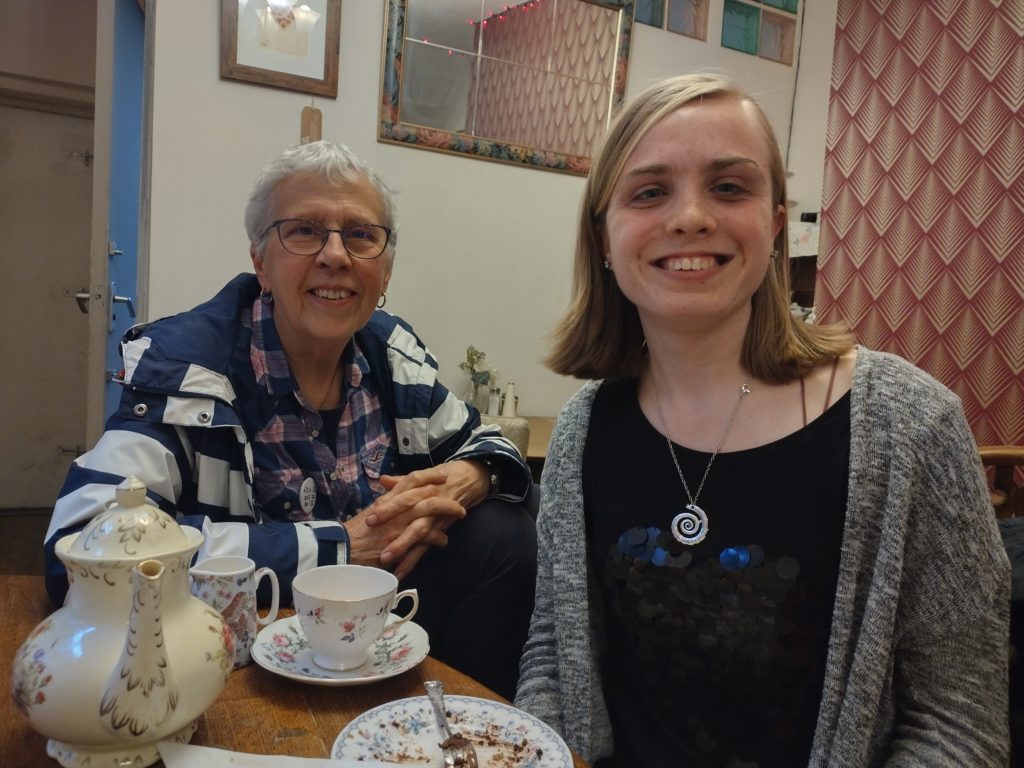
“Let’s not kid ourselves, the thought of death frightens the willies out of me, but it’s the only certain thing in life.
“There’s nobody here I know personally, yet for this fleeting two hours or however long it is, you’re with like-minded people and that’s fantastic.”
This, in a nutshell, is the strength of the death café movement. There are young, old, men, women, people from every race, every culture, every walk of life, united for one purpose.
The group is largely atheist or agnostic but Debbie points out there have been many Christians and representatives of all the major religions over the years.
While many of the group have experienced bereavement, reasons for attending vary greatly and could be as simple as an interest in mortality.
Chris Leonard 58, from Stockport explained, “I find death fascinating considering it applies to everyone; I’m surprised how much stigma there is and how much of a taboo it is, we do dress death up in terminology, talk about passing away, make it nice and safe, put it over there, nobody talks about it”
As Chris is keen to point out “it’s not a counselling session,” but whatever their motivations, having a space for people to explore death and grief openly in a non-judgemental environment seems a no brainer.
“When you provide the environment for people to share, it’s very humbling to learn of others’ experience, that’s quite a privilege.”
For other attendee’s like Sarah Brewerton from Chorlton who had a 40 year career in bereavement support working on a bereavement support helpline for a stillbirth and neonatal death charity and as a hospital chaplain, the motivation is more about giving than receiving support.
“People’s stories are fascinating because every person is unique therefore their bereavement is unique, there’s always something you can learn.”
Upon retirement, Sarah didn’t want to lose her skills and upon discovering the death café found a place to put them to use.
“I feel comfortable talking about bereavement, hearing of the death of a young person or child is challenging but after my own experience of the death of a child, it’s also put into context my own grief and you can’t help but receive support here too.”
So inspired have two of the group been by the death café movement, they plan to start their own death cafés in their local area.
Iris’s will start in July in Frodsham in July at a local drop in centre, coincidentally named the Hive.
“They don’t know what’s going to hit them!”

